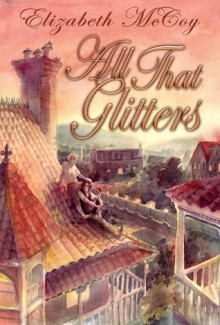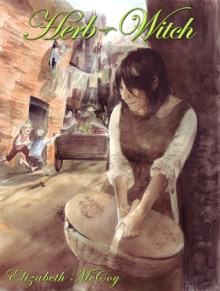
This takes place quite some time after Herb-Wife – I can't remember if their exact age was ever stated, but my guess was that Kessa and Iathor's twin sons were at least in their late teens or early twenties. Jani is a grown roof-rat, hired to either assassinate Kessa (which she has no plans to do) or poison one of Iathor's servants. The poison is slow-acting, and the plan is to tell Iathor, who is known for being soft-hearted where his servants are concerned, that he can have the antidote if he disinherits Iontho, his heir.
What Jani doesn't realize is that the person she pegs as a servant is actually Iontho. Iontho is immune to the poison, but plays along and tracks Jani back to her hiding place, where she gives him what she thinks is either a temporary loyalty potion or a truth potion. Iontho is shocked to realize it's the dramsman's draught, a permanent loyalty potion. He drinks it all (again, he's immune) and plans to find out who Jani got the draught from, and why they wanted him disinherited or his mother dead. In an effort to test whether the potion has worked, Jani orders Iontho to kiss her (a moment of surprising stupidity on her part), which very slightly binds her to Iontho. Iontho, meanwhile, pretends to be a servant named Yan, and Jani's new dramsman.
So now Jani has (she thinks) an illegal dramsman and an employer who is involved in deadly politics and is therefore more trouble than he's worth. She comes up with a plan to cut herself loose and maybe make a bit of profit, while at the same time hopefully escaping punishment for having an illegal dramsman, however accidental.
I know all this sounds complicated, but I do think newbies to this world could start with this book, if they wanted, rather than McCoy's Lord Alchemist duology. Some character relationships and history might go over new readers' heads, but McCoy gives enough background information about those things and stuff like the dramsman's draught that it shouldn't be too much of a problem.
My feelings about this book are complicated. On the one hand, I thought it was better written and more tightly plotted than McCoy's Lord Alchemist duology, which I still feel would have been better edited down and released as a single book. I also loved Jani's creche and all the “pantsboys” stuff (roof-rat girls who dress as boys and who etiquette therefore dictates should be treated and referred to as boys). On the other hand, the romance in this book made me uncomfortable.
Part of my problem was that I wasn't sure what the dividing line was between a dramsman's wishes and his or her master's wishes. If a dramsman could tell that his or her master really wanted something, would a dramsman be influenced to want to do or provide that thing, even if his or her master didn't explicitly give them an order?
Let me back up a bit. Jani thought Iontho was her dramsman, although, as a commoner, she didn't always seem to understand exactly how deep a dramsman's loyalty went. I gave her a bit of leeway for that, even though I couldn't help but feel that it was unethical for her to begin a sexual relationship with her accidental dramsman. I didn't feel quite as charitable towards Iontho. He knew that Jani had tasted a little of the draught via their kiss and that she'd therefore had at least some of her ability to consent taken away. Whether he was attracted to Jani or not should have been irrelevant.
In some ways, I preferred Jani to Kessa – although Kessa was a more interesting and complex character, Jani had fewer jagged edges. However, I definitely preferred Iathor to Iontho. Iontho flubbed a few things that Iathor would never have been careless about (granted, I primarily know Iathor from his older and more experienced days). Also, Iathor would never have allowed sex to further complicate a relationship already complicated by the draught.
McCoy tried to work around that by making sure that Iontho always waited for Jani's permission and stopped whenever she said they should stop. The first couple sex scenes (yes, there were graphic sex scenes) were entirely about Iontho making sure that Jani was enjoying herself, and, in general, Jani's pleasure always came first. I appreciated that...but I was never able to forget that she was also being influenced by the dramsman's draught to an unknown extent.
This book is tagged as fantasy romance, but I think it would be more accurate to call it fantasy with romantic aspects, with the added caveat that it's HFN (happy for now) romance at best. I knew early on that Jani and Iontho's relationship probably wasn't going to end with marriage and babies. Iontho was his father's heir and would therefore be expected to marry an immune woman in the hope that he'd have equally immune children. There were no indications that Jani was an immune, and I wasn't sure that Iathor would approve of his son having a dramsman bride. I suppose a part of me never gave up hope, however, because the ending disappointed me. It was the best that Jani and Iontho could have hoped for, but for me it still wasn't enough.
Oh, I wish the dramsman's draught hadn't been a factor in Jani and Iontho's romance. I'd have liked this book so much more, otherwise. That said, despite the problems I've had with this series so far, I've generally enjoyed McCoy's characters and detailed world-building. I already own the next book, Crucible, and am interested to see how well that one works for me.
Extras:
- A glossary/cast list.
Rating Note:
This is one of my "I don't even know" 3-star ratings. I didn't dislike the book, but my discomfort with the romance kept me from liking it too.
(Original review, with read-alikes, posted on A Library Girl's Familiar Diversions.)

 Log in with Facebook
Log in with Facebook 






